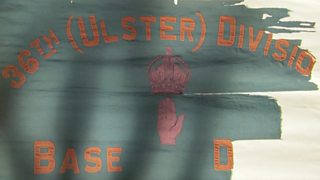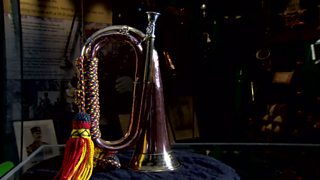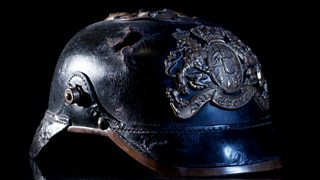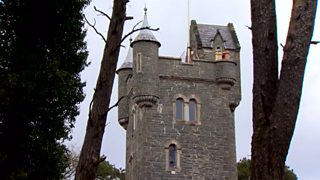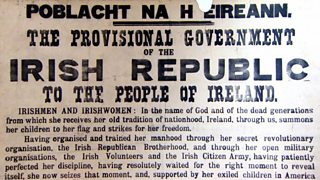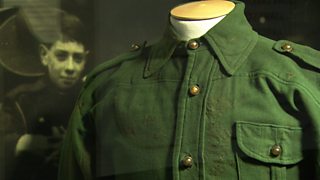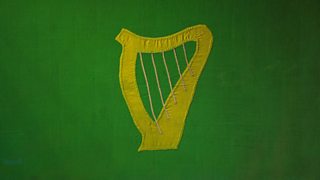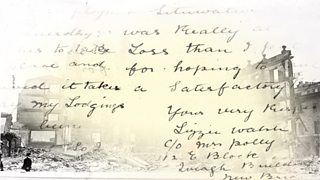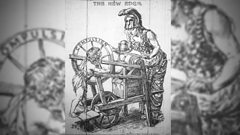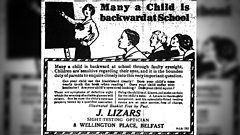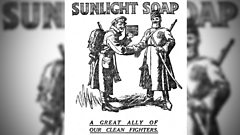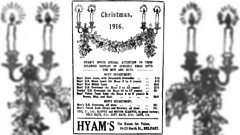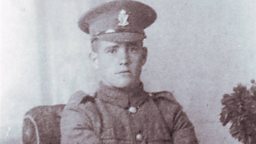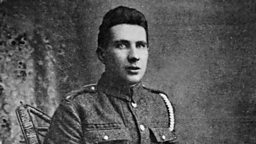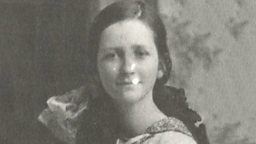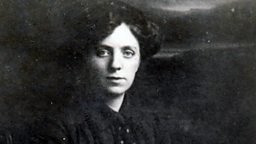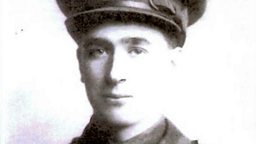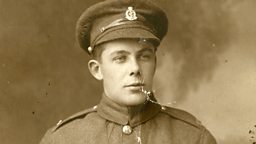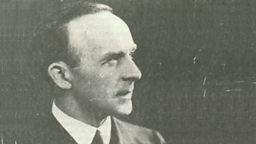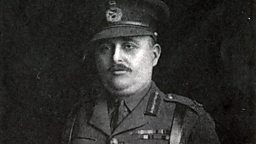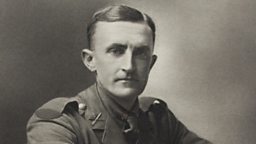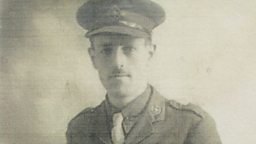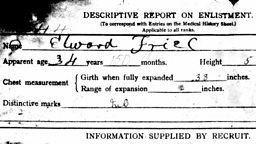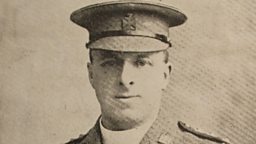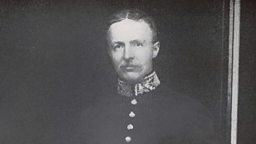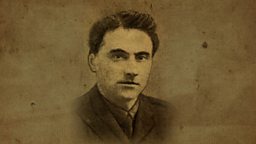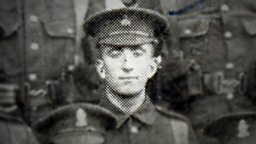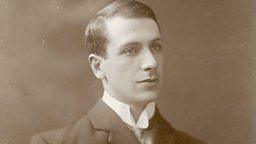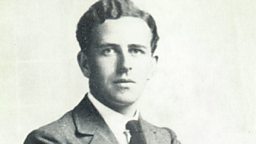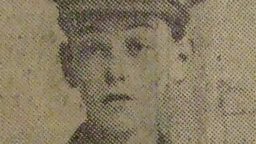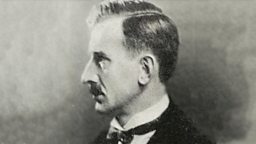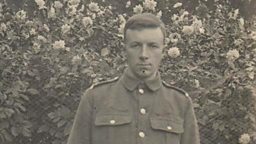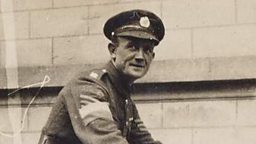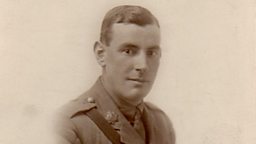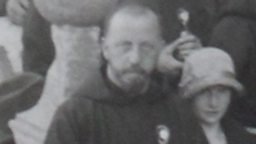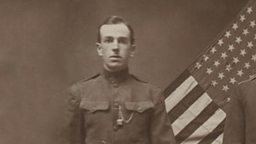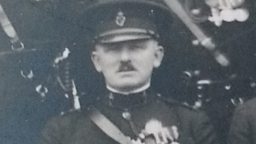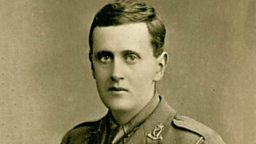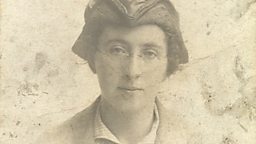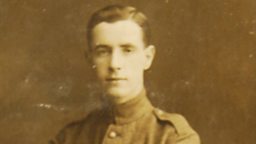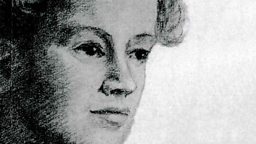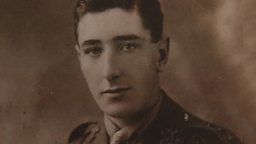George H Mullin
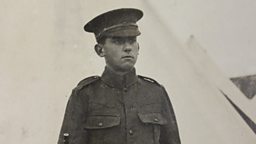
Runner at the Somme
George Henry Mullin was born c. 1895 in Belfast. At the time of the 1911 Census, he was described as an Apprentice Ship Telegraph Maker, his widower father being a Collar Cutter, with the family living in the Clifton area of the city.
All around were clouds of black smoke
In 1914, George, by now a fitter, says he enlisted with the 14th Royal Irish Rifles, 36th (Ulster) Division, "on the first day that recruiting began."
George later wrote an unpublished memoir of his wartime experience, dating it 1962. Of it, he says that "when conditions permitted, I kept a skeleton diary, which I now rewrite in the light of present knowledge."
In it, he records his own recollection of enlisting: "Monday the 14th September, 1914, was a 'Red Letter' day ... Recruitment began for the 14th Batt. Royal Irish Rifles (Young Citizen Volunteers) in the Old Town Hall, Victoria Street, Belfast ... All the prospective recruits were impatient, and in a hurry to get through the necessary procedure of enlistment."
George kept regular diary entries from then through to the first day of the Battle of the Somme, which evoke a strong sense of trench life. He says he became a company Runner, of which role he says he was "as proud as Punch." Fighting on 1 July 1916, he describes chaos on that day, but also the camaraderie he experienced.
The Somme
Trench life and build-up to 1 July
George Mullin's memoir/diary describes, on a regular basis, his World War One experiences over a number of years, including his arrival in France:
6 October, 1915
"... the YCVs have at last reached France. With no room to move, we are packed in Army bell-tents at Le Harve transit camp. Today is Wednesday October 6th, 1915. The day passes slowly, as there is nothing to do but wait patiently on orders to move. We are more or less prisoners in our tents owing to the deep mud outside."
From then on, Mullin's account tells of all kinds of aspects of daily life, from washing to the conditions of the trenches:
Wednesday 5 January, 1916
"12 Platoon not on parade. Went for bath. The bathroom is a barn with ten wooden tubs filled with warm water turned white by cresol a strong disinfectant. One tub serves half dozen men."
Tuesday 29 February, 1916
"Trenches in shocking condition. One hole called a dug-out for all 12 platoon. Mud everywhere, and everything covered with it. It is really a feat of strength and courage progressing along the new trench. It takes hours. The trench has not been revetted, consequently the mud is 3 feet deep."
As the year 1916 progresses, he begins to describe particular preparations for an attack:
Monday 15 May, 1916
"Roll call 7 am. Parade 8.45 am. All day we are training making determined attacks on the dummy trenches. They represent those of the German system to be attacked sometime in the future. The idea is we will be able to recognise the lay-out and our objective when it comes to the real thing."
Monday 22 May, 1916
"... My stock is rising. I report to Major Mulholland Adj at Bn HQs at 9.30am. I am HQ runner."
The increasing pace of preparations becomes evident in his entries:
Monday 12 June, 1916
"At 1pm, urgent orders issued to pack up and get ready to move at 2pm. The pace of events seems to be quickening now. There is excitement in the air we breathe."
Saturday 24 June, 1916
"A heavy bombardment by our artillery has started on our front. It seems to be persistent and determined."
Monday 26 June, 1916
"As a runner, I have to change into 'Shorts' Bn. Orders. I like the change. They are distinctive and mark one out."
Tuesday 27 June, 1916
"Everything seems to be in order for attack. Heavy bombardment all night. The enemy is shelling our batteries all round and further back."
Wednesday 28 June, 1916
"Breakfast 8. Raining heavily. Heavy bombardment continued without interruption. We are now told the attack has been put off. Nothing to do but wait. Orders recd. at 10 pm to proceed to Forceville. We are all surprised and bewildered at orders being changed so suddenly."
Friday 30 June, 1916
"We are told that we are to march off at 10pm ... I am happy and confident in my own ability to meet and face whatever comes my way. As we march up the line we pass Major Bowen, the CO on his horse, sitting watching us pass. Each platoon gives him a hearty cheer. He wishes us the best of luck as we march past. It is all he can do. There is no rain. The guns are all firing. The din is terrific."
Saturday, 1 July
George describes the waiting, on the morning of the first day of the Battle of the Somme: "It is dry and mild, and there is nothing to do - only wait on zero hour 7.30 am."
"... At 7.30am we climb out of the assembly trenches and move forward ... The boys go forward as quick as they can."
Sent to deliver messages, Mullin says: "On my way back to HQs I had no time to consider the risk involved. I could hear the machine-gun bullets passing high above my head. The high trajectory undoubtedly saved my life. All around were clouds of black smoke from the enemy shells."
"After I had handed in the message, I found Elgin Ave. crowded with walking wounded, doing their best to get away before they were killed. My duty was now to return to where I came from. However I was isolated and detached, exactly what I liked."
He describes his journey back, and further experiences across the day, but says:
"It would take a much more able pen than mine to write a description of all the events that I witnessed during the Y.C.V. attack at Thiepval. There was so much shelling; all calibres trench mortars, machine-guns etc. The appalling number of casualties which thinned the ranks to such an extent that there were not sufficient men to carry out what had been planned."
"It is difficult getting through the barb-wire entanglement and across deep trenches. We do all that men can do. ... We help each other. ... We move back towards our own lines."
Sunday, 2 July
Having survived the first day of the battle, George describes conditions immediately afterwards:
"We are back in our own front line. Thiepval Wood is still being shelled. There is nothing to eat and no sleep for anyone."
"Heavy strafe continues. There is no need to add that I slept soundly until Monday morning."
Subsequent WW1 experience
Thereafter, George H Mullin continued writing to the end of the war. Injured in 1917, at the Battle of Langemarck, he was sent back to England, and subsequently to hospitals in Belfast and Bangor, to recuperate.
He spent Armistice Day in Belfast, and of it recalled: "It was a day of great jubilation. I well remember that day, and the feeling of intense relief."
He was demobilised in December 1918.
Looking back, he said: "When I look back to the distant war years, and recapitulate my experiences, I never cease to wonder how I ever survived. The more I ponder the matter, the more I become convinced of the truth of my belief, that a guardian angel must have been hovering over me. There's a divinity that shapes our ends, rough new them how we will."
These pages are based on personal testimonies and contemporaneous accounts. They reflect how people saw things at that time and are not meant to be a definitive history of the period.
Voices 16 objects
Voices 16 galleries
Credits
With thanks to the Royal Ulster Rifles Museum for the image, and for permission to cite from George Henry Mullin's unpublished account, With the Ulster Division in France: From Finner Camp to Fortruin with the 14th Battalion, Royal Irish Rifles (YCV) and the aftermath.
